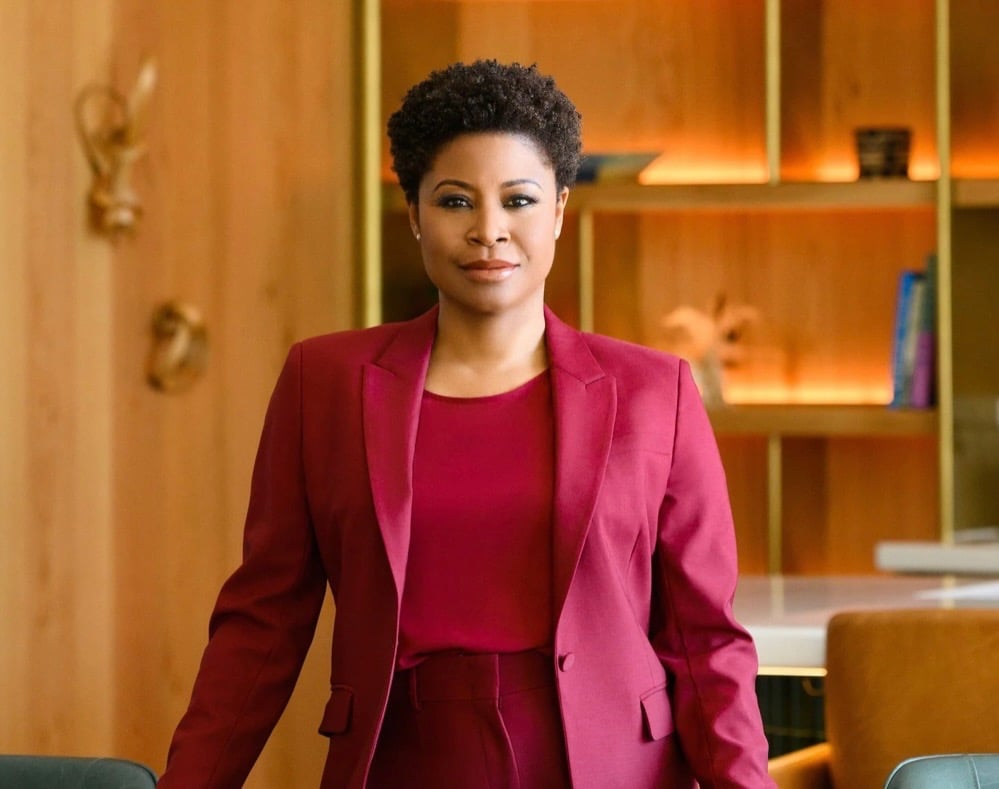
Dr. Wendi Williams is a visionary psychologist, educator and leadership strategist with more than two decades of experience. As President-Elect of the American Psychological Association, her work centers on advancing the well-being, leadership and liberation of Black women and girls.
In honor of World Mental Health Day, BlackDoctor spoke with Dr. Williams about the systemic challenges that lead to burnout for professional Black women, practical strategies for protecting your mental health in toxic workspaces, and her priorities as President-Elect of the American Psychological Association.
You’ve spent your career advancing well-being and leadership for Black women and girls. Please introduce yourself and your work, and then dive into how your work centers around catering to the mental health of these individuals and creating healthier workspaces and communities overall.
My name is Dr. Wendi Williams. I’m a psychologist and an educator, and someone whose work has centered leadership development for and about and related to Black women and girls generally. I got started in this work through a focus on young people, actually, adolescent development and leadership as a type of intervention to support adolescent girls to address some of the mental health and risk behaviors that they are more likely to face within the context of their development. Specifically, my early work focused on addressing early sexual experiences and how leadership development actually positioned young girls to think twice about what those experiences are and to develop the self-esteem and sense of agency and self-authority to navigate those situations differently.
When I think about mental health and the work that I’ve done with Black women and girls, I have a very similar perspective. I do think that folks are more likely to care for and to require that the environments around them are caring towards them when they understand and own their value. And that, through the lens of leadership, is where I think many people begin to have a sense of the esteem and the integrity and dignity that they are deserved and that they require in order to be well.
Can you speak about the importance of World Mental Health Day in terms of raising awareness and driving action for mental well-being?
World Mental Health Day is an important opportunity to bring awareness and to recognize the importance of mental health and mental wellness for everyone, and that it’s a right and an opportunity for everyone. That’s not always recognized.
Can you talk about this year’s theme and what it means in the context of the world we’re living in today?
Specifically to the theme, this year is centering access and services for mental health in catastrophes and emergencies, and thinking about the ways that folks are grappling with the current context of our world and the need for more attention and care to the health and mental wellness that they are feeling challenged around.
To your point about the level of care and dignity people deserve, you also have your book Black Woman at Work: Refusal and Recovery. In it, you write about reclaiming your mental and emotional space in professional environments. Can you talk about what prompted you to write that book?
Beyond personal experiences, I think one of the things we say in psychology and social science research is that oftentimes a researcher gets an idea based on some direct experiences. I started writing that book in 2018, in the midst of the previous presidential administration, where I witnessed on screen various journalists with 25 to 30 years of experience, Congress persons, and representatives being so severely disregarded and disrespected. I know at that time there was this popular hashtag #BlackWomanAtWork. I was in the midst of writing this book, and that was a focusing experience.
What I knew then and I know now, and especially now, I think it’s probably a bit worse, is that what we were seeing in those moments—the ways those Black women who were simply doing their jobs and doing them well, the very well-mentored, educated, but deeply experienced women in the context of their work, and as easy as it was to delegitimize them and to disrespect them, even at the height of their careers—imagining what that experience would be for people like you or me. As a psychologist, I wanted to write about that, and I wanted to advance and amplify that experience and the underlying reasons why we are seeing that, which are based as much in historical and contextual contexts as well as in our current-day political and socio-cultural environments.
The professional climate has gotten worse, and women of color are struggling with burnout and the pressures to perform and exhibit resilience. From your perspective, how do you think leaders and organizations can create a culture that supports well-being rather than those surface-level wellness initiatives?
Black women are at the seat of experiencing their work product being undervalued, their contributions intellectually being misattributed to other people, and their efforts being unappreciated, but then also taken up and even stolen by others as having been the author or the originator of an idea. And because it’s coming from her, not being seen as valuable.
We see a lot of backlash and conversation around the “DEI hires,” which is meant to suggest that someone doesn’t belong in a place that they are in. Truly, the dimensions of diversity, equity, and inclusion are only meant to say that we’re diversifying with people who also have the experience. But with that attack on those words, there is this search for the reason or the rationale for why she doesn’t belong or doesn’t deserve to have the role or position that she has. And so, we’re constantly in the space of trying to prove and over-prove something that is so natural and not hard to grasp. That is leading to stress and burnout. It places her in a pretty impossible situation. We’re witnessing this with many Black women, whether it’s an attack on their actual work performance or just the idea that they don’t belong here anymore. We’ve seen that most recently with the accounting of the over 300,000 Black women who have recently been displaced from work and are out of work.
RELATED: Over 100,000 Black Women Lost Jobs in April—Here’s What’s Behind the Surge
If a Black woman is in a harmful work environment, what are some of the signs that she may need to refuse or protect her mental health?
A lot of Black women are likely experiencing environments that are feeling increasingly toxic and increasingly problematic.
I would say being in workspaces where you feel like you’re not being heard. In my book, I talk about being “shushed”—literally not being heard or not being listened to. Sometimes being shushed is having the things that you have said being misattributed to somebody else, or in this refusal of being understood and being taken up as somebody who had a good idea or something to offer.
There is also how a Black woman can be passed over. The institution or organization doesn’t want to invest in her, so you may see something “die on the vine” in the workplace. They’re just not invested, they’re not giving stretch assignments, or she’s not being seen as somebody with capacity or opportunity to push or demonstrate their leadership or their skillset in a way so that they could qualify for recognition, for promotion, etc. So it’s all these different types of indignities and things that can happen, let alone just some of the outright racist or sexist things that can happen in terms of inappropriate memes or jokes that are shared in the workplace.
Recent studies have shown that a lot of Black people, in particular, are not as interested in returning to the office because they actually found there to be instances of them just having a break from some of the typical microaggressions that one has had to experience and deal with when they’re in person in the work environment.
For those women who identify with those things, are there any strategies or practices they can do to help them nurture their mental health and reclaim their sense of power?
I am a big advocate for us relying on each other in spaces away from work. I think that we need to think about where there can be community spaces, sister circles, or just regenerative friendship spaces away from work and away from the conversations that happened at work. Typically, when folks are stressed with work, they go to happy hours and bemoan their misery there, but what that actually does is prolong the time and the conversation with yourself about something that is deeply problematic and unhealthy for you. With your friends and your colleagues away from work, with your family away from that context, where can you give some space and some perspective?
I think mentoring—if you have a mentor or if you can find folks who can give you some insight and perspective away from where you are, but with some wisdom and some experience—that can be helpful. Some people do explore professional coaching and support in this space so that they can learn how to navigate and keep the work stuff in perspective.
One of the things that I try to do with my clients is to remind them that it is a job; you need a job, but it is just a job. For folks who have invested a lot of time and energy in their education, they may begin to over-identify with their work environment and see it as a part of their identity. This actually can make these types of instances worse for them because they’re seeing it as a personal attack. In what ways can we create some internal boundaries between this is the work I do and the work environment is not who you are? Really finding some ways to uncouple and to separate that so that your identity is not tied to or your sense of whether or not you can live at your life purpose is dependent entirely on this work environment that you don’t have all this control over, and which can be sometimes harmful to you.
RELATED: 6 Jobs That Can Cause Depression
You also have the concept of Black Women’s Laboratory Leadership Practices, which has integrated healing, leadership, and liberation. Can you explain this framework and what it means, and how it redefines how others lead and care for themselves?
The challenge that we have is that there’s a leadership legacy that comes through our own ancestral history and wisdom that we’re not always able to access because we’re given a very narrow framework in which to think about where leadership can come from.
Black Women’s Laboratory Leadership Practices (BWL) is a framework that is really drawn from the leadership experiences and leadership practices that we see in Black women over centuries in this country. I’ve identified five maneuvers and three mindsets that signify this leadership practice:
The five maneuvers are ways of navigating typical leadership contexts:
- Resourcefulness
- Complexified Grit
- Undisputed Dignity
- Transformational Equity
- Speculative Innovation
The three mindsets to be able to actualize them are:
- Love
- Persistence
- Resilient Joy
The idea here is that there are ways in which Black women over centuries, since the 1700s, have demonstrated that we are able to do much more with less, that we have a stick-to-witness and an ambition toward our liberation and freedom, that we demand and respect for ourselves no matter how other people see us, that we have a vision for equity that includes everybody no matter what, and that we are speculative about our innovation—constantly and always having to imagine a new, a different world than what we have any reasonable expectation for, given what our current circumstances are.
You speak about the link between clarity, courage, and leadership. How can these qualities help people navigate uncertainty and change both personally and professionally?
I think at the heart of these concepts is that we have to be honest and clear-minded with ourselves about the situations that we find ourselves in, but also who we are. Part of the challenge for many of my clients is that they are getting caught up in cycles of explanation and narrative that are not relevant to them. So, having clarity around where you and others begin, and where their projections around you and about you are coming up, and whether or not that actually is true, becomes important.
Courage is certainly important in terms of being able to be honest with yourself, but also being honest with others. The courage to speak your truth and the courage to say the things that you know you see—because that is leadership. I think that these are the elements that lead to leadership: you have clarity and you have courage, and that makes you someone who is able to lead with compassion, but also the discernment around the situations that we’re grappling with and the context in which you’re being called to do your work.
As President-Elect of the American Psychological Association (APA), can you talk about some of your priorities there in terms of advancing mental health equity and culturally responsive care?
Overall, I believe that the field of psychology should be and is one for all of us. I know that that’s not always the case; communities, members of even the African American community, have not always felt there’s this accessibility to the mental health space. My specific initiatives speak to that point:
- “100 Psychologists Rising”: To acknowledge and lift up the work of psychologists who do the work of psychology in unexpected and non-traditional ways. Our field should give away our knowledge base because it helps to improve and support the wellness of society.
- A strong focus on youth mental health and wellness, including a youth mental health summit initiative.
- Wellness in Work Experiences: This stems from my work on Refusal and Recovery. We expand upon the experiences that I’ve learned through my focus on Black women to how that rising tide can really lift all boats in terms of our understanding of how to create wellness-focused and wellness-facing work organizations.
Is there any message of hope or encouragement that you would like to share with those who may be struggling to maintain balance, purpose, and peace in today’s world?
I appreciate this question because I know that folks are having a hard time, and it’s understandable that they are. I think that would be the first thing that I would say: what you are experiencing is valid, and it is hurtful and it is painful, but also that wellness is your birthright. Mental health and mental wellness is something that you have a right to. I hope that in any ways that you can create some small or large spaces of peace and distance from some of the difficulty to remember and to access your joy, that I hope you do that.
Where can people learn more about your work?
People can go to DrWendiWilliams.com, and you can access any of the information that we’ve talked about here there, and also just follow on Instagram at @DrWendiWilliams.








